Faith and Politics

Egypt's military forcefully seized power from President Morsi on Wednesday. An emergency meeting of top civialian and religious leaders has convened to create an interim government and plan for new elections. The whereabouts of Mr. Morsi remain unknown. The New York Times reports:
The developments followed the lapse of a 48-hour deadline imposed by the military generals on the increasingly isolated president to meet the demands of millions of Egyptians disaffected with the one-year-old governance of Mr. Morsi, the first democratically elected leader of Egypt.
Read more here.
WATCH LIVE:

Tomorrow, millions of people across this land, will be celebrating our nation’s freedom. Many will be marking Independence Day by going to see the fireworks, watching Fourth of July parades, or just having a barbecue and enjoying time together with their family or friends.
One of the things I began doing a few years ago on the Fourth of July was to call a very special person in my life and in the life of my family. His name is Paul Anderson. Had it not been for Paul and his family, my family and I would not have been able to emigrate in 1987 from Poland to the United States. So on every July 4, I call Paul and thank him for helping me and my family arrive safely and settle in this country.
I tell him that he’s had an important part to play in so many good things I’ve experienced over the past 26 years that I’ve been living here — including discerning a Franciscan vocation and becoming a friar.
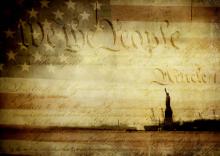
What do I love about America? I love the land, one of the most spectacularly beautiful countries in the world (and I’ve visited many of them). I love walking our long stretches of beaches, hiking our majestic mountains, seeing the desert skies, walking beside the rivers, sailing along the coasts, and visiting hundreds of lakes in my home state of Michigan, where I camped as a kid. I even love some of our big cities! “O beautiful for spacious skies, for amber waves of grain, for purple mountain majesties, above the fruited plains.” I love our many diverse cultures, including their music, their food, their art, their sports, and their particular stories and histories.
I especially love our best national values: freedom, opportunity, community, justice, human rights, and equality under the law for all of our citizens of every race, creed, culture, and gender, not just for the rich and powerful. In particular, I love our tradition and history of democracy, its steady expansion here, and how it has inspired the same all over the world. We take legitimate pride in seeing how our founding documents have been the models for many new nations.

“If you love somebody, set them free. Free. Free. Set them free.” Of all the songs to come to mind during this Independence Day weekend, this one rings in my head. Sting, the artist, did not have America’s freedom celebration in mind when he coined these words. Honestly, the song has little to do with patriotism; it is more of a ballad of love lost and letting go. Nonetheless I dare to invoke it, as the words resonate with the spirit of autonomy that is so pervasive on July 4. “Set them free. Free. Free. Set them free.”
Each year at this time, our country focuses on liberty, the red-white-and-blue, and “My Country Tis of Thee.” I am grateful to live in the U.S. and the freedom this affords. Yet, what about persons who are not so independent — the unemployed who rely on federal subsidies, children whose schools are closing due to no fault of their own, and yes, the millions of Americans in the prison system? Although the Fair Sentencing Act of 2010 reversed the disparity between crack and cocaine convictions implemented by the Anti-Drug Abuse Act of 1986, the prison rate remains exorbitant. More than 2.2 million are still behind bars. The Texas execution rate is at 500 and counting. Forty-eight percent of persons in federal prisons were convicted of drug offenses, according to The Sentencing Project. A reversal in policy three years ago has not flipped today’s prison numbers. So many are not free.

WASHINGTON — Just days after the Obama administration issued final rules to religious groups for its contraception mandate, a broad coalition spearheaded by Catholic and Southern Baptist leaders is pushing back, saying the rules threaten religious liberty for people of all faiths.
In an open letter titled “Standing Together for Religious Freedom,” the group says the final rules from the U.S. Department of Health and Human Services violate their freedom of conscience.
“We simply ask the government not to set itself up as lord of our consciences,’’ said Russell Moore, president of the Southern Baptist Convention’s Ethics & Religious Liberty Commission. He was joined by Archbishop William E. Lori of Baltimore at a news conference at the National Press Club.
“HHS is forcing Citizen A, against his or her moral convictions, to purchase a product for Citizen B,” reads the open letter signed by dozens of leaders from evangelical, Orthodox, Mormon and Hare Krishna groups. “The HHS policy is coercive and puts the administration in the position of defining — or casting aside — religious doctrine. This should trouble every American.”
Following last week's Supreme Court decisions on DOMA and Prop 8, social ideals within the Republican Party are being brought to the forefront as Republican’s begin to strategize ways to gain support for the 2016 election. The Associated Press reports:
At the same time, the Supreme Court rulings supporting gay marriage attracted broad criticism from most 2016 hopefuls, though Paul suggested that Republicans need to "agree to disagree on some of these issues." That foreshadows likely fissures ahead, as Republican contenders face increasing pressure to show more tolerance toward gay marriage with many Republican voters in their 20s, 30s and 40s calling for acceptance.
Read more here.

Two top managers of the Vatican Bank resigned on Monday, just five days after Pope Francis appointed an independent commission to conduct a top-to-bottom review of the scandal-plagued bank.
The surprise resignation of the bank’s director general, Paolo Cipriani, and of his deputy, Massimo Tulli, follows the arrest of a senior Vatican official with close ties to the bank who was charged on Friday with attempting to smuggle 20 million euros into Italy from Switzerland.
Cipriani, 58, served as the bank’s director general since 2007 and will be replaced on an interim basis by the bank’s president, German financier Ernst von Freyberg, who was appointed last February in one of Pope Benedict XVI’s last official acts.

The soundtrack for a lot of Orthodox Jews this Fourth of July will be the mute button.
As music gallantly streams at barbecues and fireworks displays across the nation, many Orthodox Jews will silence their TVs and avoid live music performances, such as the annual Boston Pops concert on the Esplanade Hatch Shell.
As it does every three years or so, Independence Day falls during a three-week Jewish mourning period, circumscribed by two fast days: the 17th of Tammuz, which falls on June 25 and Tisha B’Av, which falls on July 16.

During the July 1-3, 1863 Battle of Gettysburg, there were Christians and Jews on both sides of the conflict who knew the answer to the question “Whose side is God on?”
Or at least they thought they did.
In 1861, Confederate President Jefferson Davis declared: “Our cause is just and holy,” and the South self-assuredly adopted as its motto Deo vindice (“God will vindicate us”). In the same year, Julia Ward Howe composed the “Battle Hymn of the Republic” with the triumphant words: “He hath loosed the fateful lightning of His terrible swift sword. … I have seen Him in the watch-fires of a hundred circling camps. … Glory, glory Hallelujah, His truth is marching on.”
THE CONGREGATIONAL HEALTH NETWORK began with a simple request from the largest hospital network in Memphis to a group of local pastors: Help us take better care of your people.
Ten years ago, officials at Methodist Le Bonheur Healthcare were worried that chronic diseases such as hypertension, diabetes, and obesity were threatening the well-being of local residents and sending health-care costs through the roof.
“People in their 20s were coming to the emergency room in end-stage renal failure,” said Rev. Bobby Baker, a Baptist pastor and director of faith and community partnerships at Methodist Healthcare. “That person is going to be using critical care resources for the rest of their life.”
Hospital officials knew something had to change. They wanted to focus on preventive health care—getting people in to see their doctor long before they were in a crisis. So in Memphis, a city where faith remains a powerful force and more than 60 percent of the population has ties to a religious group, they turned to churches for help. It started small, with a group of about a dozen pastors at churches near Methodist South hospital, in the city’s Whitehaven neighborhood. Those pastors recruited church members to serve as liaisons to the hospital, while the hospital assigned staff to work with churches. That small pilot, first called the Church Health Network, began in 2004.
Two years later, Methodist CEO and president Gary Shorb, along with Rev. Gary Gunderson, the former senior vice president for Methodist’s faith and health division, decided to expand the project system wide. That was the only way to make a significant impact on health outcomes, said Baker. “The thought was that it can’t be a pilot, it can’t be a research project—it really has to be broad reaching,” he said.
JASON COOPER LOOKS out at the audience gathered in Restoration Church and asks, “Is it God’s will to heal?”
The former art school classroom, where the Pentecostal Dover, N.H., congregation meets, is nearly full, even though it is a Thursday evening in April. In addition to the 70 or so regular members who have come to hear Cooper preach, there are nearly a dozen visitors. One woman leans heavily on a cane. Another can’t turn her head from side to side and needs neck surgery.
They are casualties of slow research and expensive health care. According to the Kaiser Family Foundation, a nonprofit health-care policy think tank, health expenditures have increased 10-fold in the past 30 years. Though some health- care increases can be attributed to longer life spans, the high costs of drugs, hospital stays, and doctor visits have been compounded in the wake of the recession.
A young woman tensely watches Cooper as if he might explode at any minute. No one knows exactly what he will do. The audience fidgets in response to his question. Cooper, with his soul patch, slick black haircut, white button-down shirt, and stone-washed jeans, looks a little like a Vegas magician.
But Cooper is a traveling faith healer.

Fundraising for the flagship anti-poverty program of the U.S. Catholic bishops is slowly recovering after being battered by the recession and sharp attacks on its mission.
Officials at the Catholic Campaign for Human Development said that when 2012 collections are tallied after June 30, the program will match or slightly exceed last year’s mark of about $9.5 million. While that is still significantly down from the $12 million that the nationwide campaign was netting a few years ago, the upward trend is reassuring.
“We are pretty optimistic,” said Ralph McCloud, director of the CCHD. McCloud said he was still cautious, given the uncertain nature of the economy, but added that “if things keep going the way they have been, we could see a bit of an upswing.”
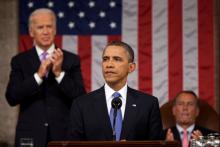
The Obama administration on Friday issued final rules for religious groups for its controversial contraception mandate, maintaining its position on who qualifies for religious exemption and allowing no carve-outs for private business owners.
More than 60 lawsuits have been filed over the mandate, a part of President Obama’s Affordable Care Act that requires most employers to provide contraception at no cost to employees.
Just as when the draft rules were first unveiled in February, conservatives denounced them as an unconstitutional violation of religious freedom that forces religious organizations and the religious owners of private businesses to offer services they find morally abhorrent.
The Supreme Court decisions on gay marriage, while historic, didn’t settle the issue. In fact, they fuel it.
For President Obama, the repercussions of Wednesday’s ruling striking down part of the Defense of Marriage Act will mean review and revisions in hundreds of federal laws. In everything from Social Security checks to Pentagon benefits, gay married couples now must be treated the same way as heterosexual couples.
For gay rights advocates, the twin decision that opens the door to resume same-sex marriages in California bolstered determination to expand the right to wed for gay men and lesbians. The Human Rights Campaign set a goal to achieve that in all 50 states within the next five years.

When it comes to God and country, white evangelicals report the strongest levels of patriotic feelings in a new poll, with more than two-thirds (68 percent) saying they are extremely proud to be an American.
That figure was markedly higher than for white mainline Protestants (56 percent), minority Christians (49 percent), Catholics (48 percent) and religiously unaffiliated Americans (39 percent), according to the study, conducted by the Washington-based Public Religion Research Institute in partnership with Religion News Service.
White evangelicals are also more likely than any other religious group surveyed to believe that God has granted the U.S. a special role in history (84 percent) and to say they will likely attend a public July 4th celebration (62 percent).
“DOMA is dead.”
Such were the chants heard outside the United States Supreme Court yesterday when it was announced that the highest judicial body in the nation voted 5-4 to strike down the Defense of Marriage Act (DOMA). That’s right. As of yesterday, there is no longer a federal law defining marriage as a union between a man and woman.
Of course, not every American is roundly rejoicing. Responses from the Christian community, which has become more divided over the issue in recent years, are mixed. Conservative Christians seem mostly despondent while the progressives among them are mostly celebrating. I spoke with several prominent Christians from across the political spectrum today to get their reactions to the Court’s decision:
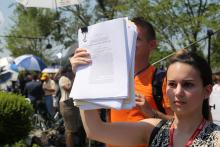
In the Methodist tradition in which I was I raised, there is a concept of perfection. We “strive for perfection” in loving each other and loving God. It is not about avoiding all mistakes. It is about growing in love for neighbor and being hospitable to all we come in contact with. This is the point of our theology: as we grow in faith and love, we become closer to God. In the end, resisting God’s call to love others is pretty hard to do.
And yet we know not everyone we meet is irresistible. We all have moments when some folks are harder to love than others. Sometimes those we find difficult to love are members of our own families. Other times they are friends we’ve had a conflict with. And for some of us, they are hard to love simply because of whom the other person loves.
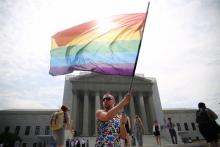
The Supreme Court this morning struck down the Defense of Marriage Act, 5-4, which prohibits the federal government from recognizing same-sex marriages performed in states.
From the opinion:
"DOMA violates basic due process and equal protection principles applicable to the Federal Government. The Constitution’s guarantee of equality 'must at the very least mean that a bare congressional desire to harm a politically unpopular group cannot' justify disparate treatment of that group."
Read the full opinion here.
Following the court's announcement, President Barack Obama Tweeted his support.
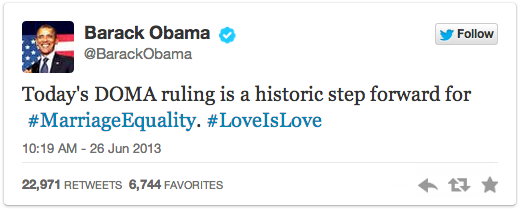
The Washington Post reports:
“The federal statute is invalid,” wrote Anthony Kennedy in his majority opinion, “for no legitimate purpose overcomes the purpose and effect to disparage and to injure those whom the State, by its marriage laws, sought to protect in personhood and dignity.”
Read more here.
Also on Wednesday, in another 5-4 decision, the Court ruled that the appeal to the lower court's decision overturning California's Proposiion 8 — the state ballot measure that ruled that only marriage between a man and a woman would be recognized — had no standing, in effect, allowing same-sex marriage to continue on the state.
Read the opinion here.

In an elementary school classroom with an American flag draped over one wall, a couple dozen students rose to standing positions. Then they shifted into poses called “volcano part one,” “silent gorilla,” and “rag doll.”
Some students may not realize it, but the semiweekly, half-hour course might be gone by the time they return in the fall.
In this upscale, seaside suburb just north of San Diego, parents have filed a lawsuit arguing the Encinitas Union School District should do away with the yoga elective because the discipline is inherently religious, and the teaching of it in the public schools violates the First Amendment.
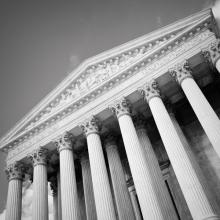
In a 5-4 decision, the Supreme Court today struck down a key section of the Voting Rights Act of 1965 that targeted states with histories of racial discrimination, saying the formula for choosing the states subject to "preclearance" is "based on 40-year-old data." The court's decision states that Congress can revise the formula under which it decides which jurisdictions are subject to oversight:
"Our country has changed, and while any racial discrimination in voting is too much, Congress must ensure that the legislation it passes to remedy that problem speaks to current conditions," the decision reads.
Congress could have updated the coverage formula at that time, but did not do so. Its failure to act leaves us today with no choice but to declare §4(b) unconstitutional. The formula in that section can no longer be used as a basis for subjecting jurisdictions to preclearance. Our decision in no way affects the permanent, nationwide ban on racial discrimination in voting found in §2. We issue no holding on §5 itself, only on the coverage formula. Congress may draft another formula based on current conditions. …
Read the full decision HERE.